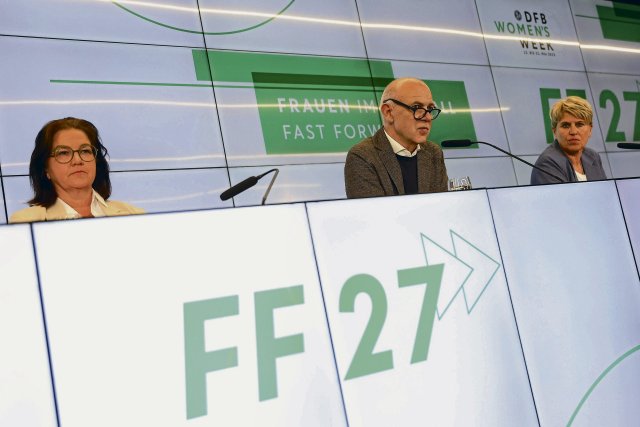
With the “FF 27” project, the DFF, led by Secretary-General Heike Ulrich (L.), President Bernd Neudorf (M.) and Head of Strategy Doris Fitzchen, wants to promote female soccer players.
Photo: imago/Joaquim Ferreira
German women's football could really use any boost right now. Still, German Football Association (DFB) president Bernd Neudorf initially couldn't drum up any volume when a key milestone was set last week for a joint bid with Belgium and the Netherlands for the 2027 World Cup. Although FIFA wants to take the tournament to new dimensions, the five-day study tour by the world association's top delegation was apparently planned without media exposure.
DFB general secretary Heik Ulrich had already said in early December that the bids were “absolutely at the level of the men's World Cup – and that's a good thing”. Germany signed 89 treaties.
Last Monday to Friday, an eleven-member FIFA delegation, along with several special personnel and senior officials from the German, Belgian and Dutch associations, got a detailed picture of the border's venues, training and fan facilities, transport and accommodation. Triangle. The stadium and football museum were visited in Dortmund and then we visited stadiums in Dusseldorf, Brussels and Eindhoven. The association of Holland initiated the application and directed it through its campus in Gjeest and the arena in Amsterdam.
Dortmund, Düsseldorf, Gelsenkirchen and Cologne have been named as German venues, but as with the 2023 Women's World Cup in Australia and New Zealand, FIFA will eventually reduce the number of venues to ten. A German city can still slip through the trembling sieve.
According to Ulrich, South Africa withdrew its application due to a lack of “very, very strong contenders” who were given huge opportunities for sporting policy reasons. The Europeans are now voting against Brazil and against a dual bid by the United States and Mexico at the May 17 FIFA Congress in Bangkok. It is clear that the votes cast by delegates from Africa and Asia are tipping the scale. Study tours in Brazil and the United States and Mexico are still pending. Overall, the global association relies on a transparent award process. Application documents are made public and the same should happen with evaluation reports.
“The goal is local competition with global impact,” Neuendorf said in a statement, along with Belgium's Pascal van Damme and Dutchman Just Spee Netherlands. “We have to be so good that the FIFA family can't ignore us,” said Patrick Kisko, in charge of the application process. The DFB head of department, who was already involved in the 2011 Women's World Cup, is promoting a tournament that is hospitable to players and fans, safe and, above all, more compact than ever before. With a radius of only 150 kilometers, air travel is unnecessary and teams and fans can live in one place.The tournament will provide a counterpoint to environmentalism: like the previous Women's World Cups in Australia and New Zealand, the Men's World Cup in 2026 in the USA, Canada and Mexico will involve flying large distances. Brazil, the United States and Mexico will have the same problem again in 2027.
But sustainability is only one aspect. Another is finance. The offer from the United States and Mexico promises revenue of three billion US dollars. The organizers write that this is possible for the rapid development of women's football. By comparison: At the 2023 World Cup, the company turned a profit for the first time with record revenues of $570 million, much to the delight of FIFA president Gianni Infantino. The European application emphasizes commercial potential through media rights and ticket or sponsorship sales. But with the best will in the world, you can't promise three billion dollars in revenue.
Become a member of the nd.Genossenschaft!

From January 1, 2022, »nd« will be published as an independent left-wing newspaper owned by staff and readers. Be there and support media diversity and visible leftist positions as a co-op member. Fill the membership form now.
More information about www.dasnd.de/genossenschaft

“Amateur coffee fan. Travel guru. Subtly charming zombie maven. Incurable reader. Web fanatic.”








More Stories
Nicolas Loufrani: Young Londoners Design Afro Hair Emojis
US Election: Trump Vs. Harris – 2024 poll numbers in America
Börse Express – USA: Retail sales rise unexpectedly